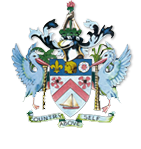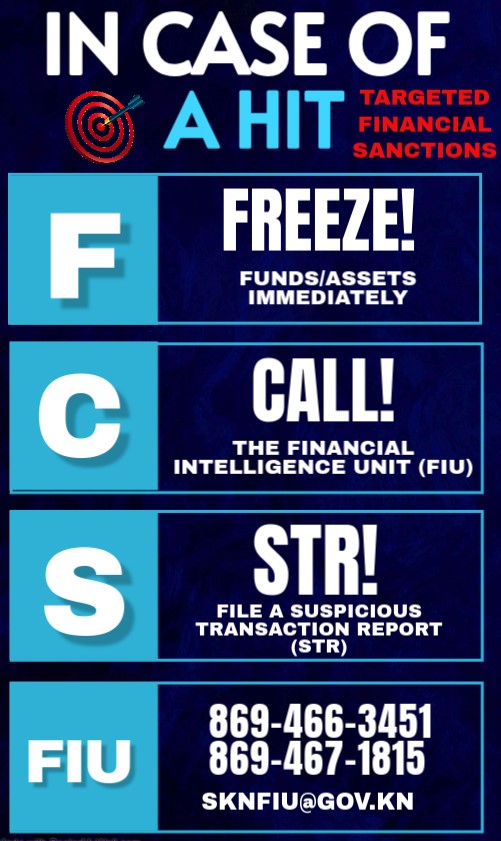The Proceeds of Crime Act, Cap 4.28 covers all serious offences. The Act creates the specific offence of Money Laundering and defines money laundering as conduct where a person engages directly or indirectly, in a transaction that involves money or other property that is the proceeds of crime or the person knowingly receives, possesses conceals, disposes of or brings into or transfers from St. Kitts and Nevis any money or property that is the proceeds of crime. Other Legislation is the Anti-Terrorism Act Cap.4.02 which gives effect to the suppression and elimination of international terrorism, and criminalizes the offence of terrorism.
The Anti-Money Laundering and Countering the Financing of Terrorism legislation (AML/CFT) apply to all Regulated Businesses in St. Kitts. The Financial Services Regulatory Commission (FSRC) has responsibility for regulating and supervising regulated businesses’ compliance with the AML/CFT requirements.
The St. Kitts and Nevis Branches of the FSRC adopted a Risk-based Supervision Framework (RBS) in May 2015 (revised in June 2017) which is applicable to both off-site and on-site examination of regulated entities.
Comprehensive and regular on-site examinations of regulated entities in St. Kitts are conducted pursuant to section 4(2)(g) of the Financial Services Regulatory Commission Act, Cap 21.10 (FSRC Act) to ensure that the Act, AML/CFT legislation and enactments specified in Schedule 1 to the Act are being complied with and that the regulated entity is in a sound financial position and is managing its business in a prudent manner.
During an on-site examination, Examiners from the FSRC would determine, among other things, whether there are appropriate policies and procedures established to ensure compliance with AML/CFT legislation and identify risk appropriately.
In particular, the AML/CFT legislation requires all regulated entities to identify, verify, obtain, maintain and monitor their customers and beneficial owners (BOs) of legal persons (companies) and legal arrangements (trusts). To increase transparency, entities and trustees are required to make this information available to the competent authorities and those conducting AML/CFT due diligence.
In order to monitor regulated entities’ compliance, Examiners will review relevant customer files of the regulated entity as well as the citizenship by investment applications to ensure that adequate Know Your Customer (KYC) and Customer Due Diligence (CDD) documents for BOs of legal persons and legal arrangements are obtained and kept up-to-date.
Such documents include a copy of the customer’s/BO’s passport or identity card (government issued) with photo ID, duly notarized; two original letters of references; one from a recognized banking institution and the other from a member of a recognized professional body such as a lawyer or an accountant; a copy of the client’s address, telephone, facsimile numbers (updated as changes in such details are noted); and proof of address via a utility bill.
Additional documents required are customer risk assessments; source of funds and wealth declarations; account opening files (if applicable); accounting records or financial statements; corporate documents; registers of shareholders/directors/ members/managers; trust deeds; letters of wishes; share certificates; minutes; resolutions, etc.
Examiners also conduct assessments of the regulated entity’s policies, practices, procedures and internal controls for compliance with AML/CFT legislation, including ongoing monitoring programs, training schedules, suspicious transaction reporting, record keeping systems, retention period and condition of records.
The results of an on-site examination influence the intensity and frequency of monitoring. Hence, entities that are operating in a satisfactory manner will require monitoring on a less frequent basis than entities with weaknesses and deficiencies.
Enforceable guidelines/regulations on Anti-Money Laundering and Anti-Terrorism are: the Anti-Money Laundering Regulations 2011, the Anti-Terrorism (Prevention of Terrorist Financing) Regulations 2011, the Financial Services (Implementation of Industry Standards) Regulations, 2011 and the Anti-Terrorism De-Listing Procedures Regulations, 2011.
The Financial Intelligence Unit (FIU) Role:The Financial Intelligence Unit (FIU) is the authority responsible to receive, collect, analyze and act upon reports of suspicious transactions from regulated business in St. Kitts and Nevis in accordance with the Financial Intelligence Unit Act, Cap. 21.09.
The FIU performs investigations and establishes a data base for detecting money laundering. They also disseminate information on suspicious transactions to competent authorities and liaise with other anti-money laundering intelligence agencies.
All regulated businesses are required to report suspicious transactions to the competent authority (i.e FIU). Failure to report suspicion of money laundering is an offence under the Proceeds of Crime Act Cap 4.28.







